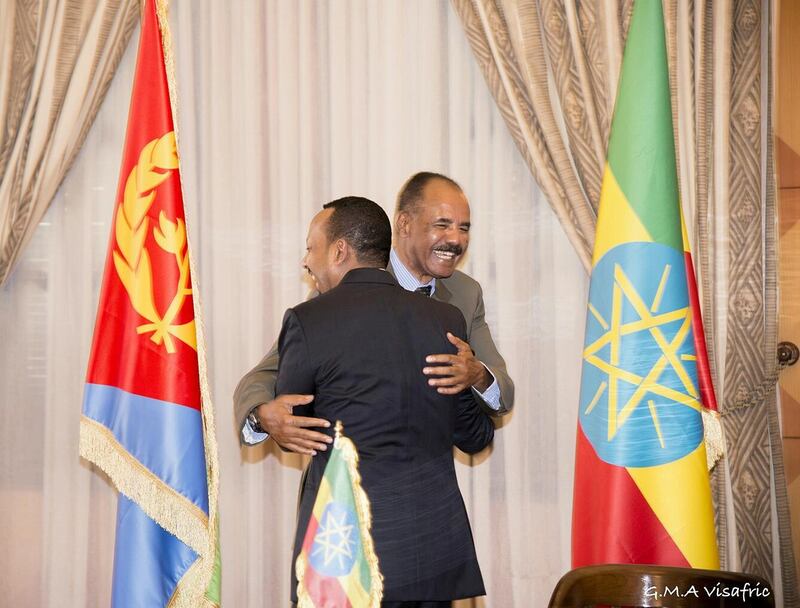A peace deal signed between Eritrea and Ethiopia on Monday has formally ended one of Africa’s longest wars, surprising observers and delighting citizens of the East African nations.
The agreement comes after 18 years of “no peace, no war” that followed two years of intense border fighting between 1998 and 2000 that killed more than 70,000 people.
A landmark summit in the Eritrean capital produced the accord between Ethiopian prime minister Abiy Ahmed and his counterpart, Isaias Afwerki. The two countries have not had diplomatic ties since the war began and Mr Ahmed's visit to Asmara was the first by an Ethiopian prime minister in 20 years.
According to the "Joint Declaration of Peace and Friendship", the Horn of Africa neighbours "will endeavor to forge intimate political, economic, social, cultural and security cooperation".
_______________
Read more:
Leaders of Ethiopia and Eritrea meet after decades of war
[ Ethiopia's new Prime Minister isn't afraid to shake things up ]
_______________
The scope of the deal has stunned analysts.
“It’s phenomenal,” said Ahmed Soliman, a Horn of Africa expert at Chatham House. “It’s a great thing in terms of legacy for the Horn of Africa, which continues to be one of the regions in Africa with the most conflict.”
Ethiopia – led since April by the dynamic Mr Abiy, Africa’s youngest leader – will gain access to Eritrea’s Red Sea ports at Massawa and Assab, providing the landlocked country an alternative to its usual ports in Somali and Djibouti.
And on Monday, Mr Abiy’s government submitted an official request to the UN Secretary General Antonio Guterres, who is currently touring the region, requesting that punitive international sanctions on Eritrea be lifted.
For the inhabitants of both countries – closely aligned ethnically, linguistically and culturally – it is a moment of genuine jubilation. After years of isolation, transport and telephone links will be reinstated. Flights could resume next week.
Families – divided for years with no means of contact – are reuniting.
There is still work to be done, particularly in previously contested border towns, where troops are still stationed.
But the end to hostilities promises greater stability across the region. Tensions between the two countries have seen them take opposing sides on regional disputes, but Mr Abiy has expressed a desire to reverse that trend.
“The overarching objective of Ethiopian foreign policy is a stable, predictable, neighbourhood,” said Ed Hobey-Hamsher, senior Africa analyst at Verisk Maplecroft, a global risk and strategic consulting firm.
Analysts hope the peace will create a “security dividend” for the region. Ethiopia is now well-placed, for instance, to mediate in Eritrea and Djibouti's border dispute.
The leaders of Kenya and Rwanda have been effusive in their praise, while Pope Francis reportedly described the rapprochement as a “light of hope” for the continent.
The peace is a crowning achievement early in Mr Abiy's tenure, who has already overseen stunning reform since assuming leadership of Africa’s second most populous country in April.
He has liberalised Ethiopia’s economy – one of the most dynamic in Africa – as well as releasing thousands of political prisoners, ending a state of emergency and fostering stronger ties with the Gulf.
But where Eritrea will go from here is unclear. For two decades, the existential threat of war with Ethiopia has justified indefinite conscription and some of the continent’s worst repression.
But with that threat gone, there is hope that the country sometimes referred to as “Africa’s North Korea” will change direction. Regional trade bloc the Intergovernmental Authority on Development has already reached out.
And now is a time for optimism. “This will be a marker for what can be achieved, how peace and security can be developed in the region,” said Mr Soliman.





